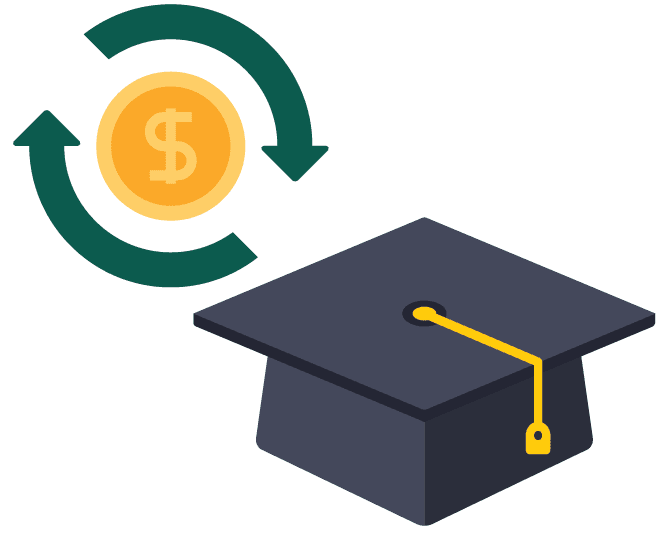If you refinance your student loans, you might get a lower interest rate or reduce your monthly payments, which could help you get out of debt faster. However, refinancing isn’t the right move for everyone — in some cases, it could be a bad decision even if you qualify for a lower rate. Generally speaking, it's often best not to refinance if you have federal student loans, as you'll lose access to federal benefits, such as income driven repayment (IDR) and forgiveness programs.
When to refinance student loans
Here are several situations in which refinancing student loans might be a good idea:
- You want to pay off your loan sooner: If you refinance, you can choose a shorter repayment term. While this might raise your payments, it also means you could pay off your loan faster. You might also qualify for a lower interest rate, which could make it easier to repay your loan more quickly.
- You want to combine multiple student loans: Keeping track of more than one student loan can be like herding cats. It can also be difficult to know which loan to pay off first. Refinancing could simplify your repayment by combining all your student loans into a single loan that’s easier to manage.
- You want to get a smaller monthly payment: The average student loan payment in 2023 was $756. If you’re having trouble making ends meet, you could choose to extend your repayment term by refinancing, which will likely reduce your monthly payment. However, keep in mind that a longer term means you might end up paying more in interest over time.
- You’re unhappy with your servicer or lender: If you’ve had a bad experience with the company managing your loans, you don’t have to stick with them. Refinancing lets you take your business elsewhere.
- Your income and credit are good: Lenders typically consider both your income and credit to determine if you qualify. Having verifiable income and good credit makes it more likely that you’ll qualify for a lower interest rate or better terms.
- Market interest rates are low: Sometimes refinancing rates fall so much that you might get a lower rate even if your financial situation hasn’t changed. You can also refinance again if rates change again in the future.
If you decide to refinance, be sure to consider multiple lenders to find the right loan for you.
Also keep in mind that while federal student loan refinancing is an option, you’ll lose your federal benefits and protections if you refinance with a private student loan.
When not to refinance student loans
While refinancing might be a good choice in some cases, here are situations in which refinancing could pose a risk:
- You have federal student loans: If you refinance your federal student loans into a private student loan, you’ll lose your federal protections and benefits. This is especially important to keep in mind if you don’t have solid financial footing, since you’ll no longer have access to IDR plans or forgiveness opportunities.
- Your finances aren’t secure: Unlike federal student loans, private student loans are not required to offer built-in protections, such as deferment or flexible repayment plans. If your income could decrease in the future, it might be better to wait on refinancing until your finances are more stable.
- You’re trying to get federal loan forgiveness: Refinancing federal loans means you’ll no longer be eligible for federal loan forgiveness programs. For example, you must have federal student loans to potentially qualify for Public Service Loan Forgiveness (PSLF).
- You have poor credit: Having bad credit could make it harder to qualify for refinancing, especially if you want to get a better interest rate. While there are options for bad credit student loan refinancing, they won’t come with the lowest interest rates.
- You’re close to paying off your loan: If you only have a short time left before your loan is paid off, it might make more sense to just pay it off instead of refinancing.
- Interest rates are higher than what you already have: If the potential rate you could get is higher than what you have on your loan right now, it’s probably better to wait. However, It doesn’t hurt to check rates to make sure.
Check Out: Private Student Loan Consolidation
Are you eligible for student loan refinancing?
While the eligibility criteria for refinancing can vary by lender, here are some common requirements that you’ll likely need to meet:
- Good credit: You’ll typically need good-to-excellent credit to get approved for refinancing. A good credit score is usually considered to be a FICO score in the mid- to high-600s or higher. Some lenders offer refinancing for bad credit, however, these loans tend to come with higher interest rates compared to good-credit loans.
- Verifiable income: Some lenders have a minimum income requirement while others don’t, but in either case, you’ll likely need to provide proof of income to show you can afford repayment.
- Low debt-to-income ratio: Your debt-to-income ratio (DTI) is the amount you owe in monthly debt payments compared to your gross monthly income. To qualify for refinancing, your DTI ratio should be no higher than 50%, though some lenders might require lower ratios than this.
Tip:
Many lenders allow you to see rate estimates by prequalifying, which doesn’t affect your credit. Just note that when you apply, the lender will conduct a hard credit pull which could ding your score.
Learn More: Can’t Pay Your Student Loans? Here’s What To Do
Is it worth it to refinance student loans?
If refinancing will help you to save money, pay off your student loans faster, or manage your loans more easily, then it’s likely worth it. However, if refinancing won’t improve your financial situation or will cost you federal benefits and protections, then it might not be a good idea.
Although you can refinance both private and federal student loans, refinancing federal student loans will cost you your federal benefits and protections — including access to income-driven repayment plans and student loan forgiveness programs.
While refinancing private student loans could be worth it, be sure to consider your options carefully before refinancing federal student loans. Ultimately, whether it’s worth it to refinance student loans will depend on your individual circumstances and financial goals.
Is now a good time to refinance?
In today’s market, refinancing isn’t as cheap as it used to be. Because interest rates on all loan types have increased since 2021, borrowers may struggle to score big on savings.
However, refinancing may still be a great option for some borrowers. For example, borrowers with high credit scores and income are typically able to qualify for the lowest available interest rates. Additionally, borrowers who currently have private student loans that don’t offer federal loan benefits might be in a good position to shop for a new loan, since they won’t lose those protections anyway.
If your interest rate is on the high end right now, you can shop for a lower one. But borrowers who scored average interest rates in the past could hurt themselves by selecting a slightly lower rate that will ultimately increase the length of their loan, and thereby, the loan's total cost.
Keep in mind:
You’ll generally need good-to-excellent credit to qualify for the lowest rates available.
How to refinance your student loans
Refinancing your student loans is a big decision, so be sure to take the time to consider whether it’s right for you.
For example, if you can qualify for a lower interest rate or better repayment terms, it could be a good idea to refinance. But if you have poor credit or unstable income, it’s probably better not to refinance your student loans.
If you’re wondering how to refinance student loans, follow these four simple steps:
- Research and compare lenders: Be sure to compare your options from as many lenders as you can to find the right loan for your situation. Consider not only interest rates, but also repayment terms, any fees charged by the lender, and eligibility requirements.
- Pick your loan option: After considering as many lenders as possible, choose the option that best suits your needs. For example, you might choose a loan with a shorter repayment term and higher monthly payment to pay off your loan faster. Or you might extend your repayment term to reduce your monthly payment, lessening the strain on your budget.
- Complete your application: Once you’ve decided on a lender, you’ll need to complete a full application and submit any required documentation, such as pay stubs or tax returns.
- Stay current on your loans: You’ll need to keep up with payments on your old loans until your new loan is processed. Once this happens, be sure to double-check that your old loans have been paid off.
Credible rating
Fixed (APR)
5.48% -
Loan Amounts
$10,000 up to total refinance amount
Min. Credit Score
680
Credible rating
Fixed (APR)
5.49% -
Loan Amounts
$5,000 - $250,000
Min. Credit Score
680
Credible rating
Fixed (APR)
5.85% -
Loan Amounts
$5,000 - $250,000
Min. Credit Score
670
Credible rating
Fixed (APR)
6.00% -
Loan Amounts
$7,500 - $200,000
Min. Credit Score
700
Credible rating
Fixed (APR)
6.20% -
Loan Amounts
$10,000 up to the total amount
Min. Credit Score
670
Credible rating
Fixed (APR)
6.34% -
Loan Amounts
$7,500 - $250,000
Min. Credit Score
680
Credible rating
Fixed (APR)
6.49% -
Loan Amounts
$10,000 - $750,000
Min. Credit Score
Does not disclose
All APRs reflect autopay and loyalty discounts where available | LightStream disclosure | SoFi Disclosures | Read more about Rates and Terms


